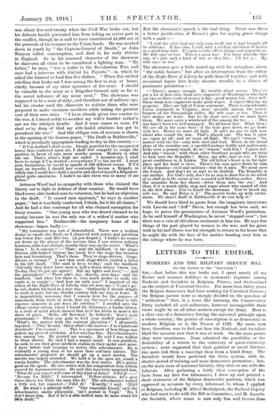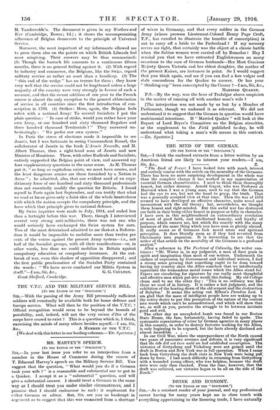TO THE EDITOR OF THE "SPECTATOR. " ] SIR,—Just before this war
broke out, I spent nearly all my Easter and summer holidays in systematic inquiries among Radicals and Socialists in Belgium, France, and Switzerland on the subject of Universal Service. For more than thirty years the Belgiau democracy had been working for Universal Service ; the Belgian parties were so sharply divided on the question of " militarism " that, in a town like Antwerp, the Conservative Party included all anti-militarists, however incompatible their views might be on all other matters except the Army. Here is a clear case of .a democracy forcing the universal principle upon a whole country ; the genesis of conscription is as democratic in modem Belgium as in the France of 1793. My main task here, therefore, was to find out how the Radicals and Socialists liked the measure now that it was at work. On the main points they were unanimous. None admitted the possibility or the desirability of a return to the voluntary or quasi-voluntary system ; none suggested that their political or social liberties ran more risk from a conscript than from a hired Army. The Socialists would have preferred the Swiss system, with its shorter period of training and more democratic promotion ; but, on the main issue of universal liability, they were at one with the Liberals. After gathering a fairly clear conception of the facts from my first few informants, I drew up and printed a short statement of the Belgian democratic position, which was approved as accurate by every informant to whom I applied in Belgium, including M. Albert Mechelynck, the Radical Deputy who had most to do with the Bill in Committee, and M. Anseele, the Socialist, whose name is now only less well-known than
M. Vandervelde's. The document is given in my Workers and War (Cambridge, Bowes; ld.) ; it shows the uncompromising adherence of Belgian democrats to the principle of Universal Service.
Moreover, the most important of my informants allowed me to press them also on the points on which British Liberals feel most misgiving. Their answers may be thus summarized: (1) Though the barrack life amounts to a continuous fifteen months, there is no general feeling against it. (2) With regard to industry and commerce, the Belgians, like the regard military service as rather an asset than a handicap. (3) The thin end of the wedge " has no terrors for them ; they know very well that the service could not be lengthened unless a large majority of the country were very strongly in favour of such a measure, and that the recent addition of one year to the French course is almost the only exception to the general abbreviation of service in all countries since the first introduction of con- scription in 1793. (4) Strikes : Here, again, the Belgian feels safest with a national Army: To several Socialists I put the plain question : " In case of strike, would you rather have your own Army, or our hundred and sixty thousand Regulars and three hundred thousand Territorials ? " They answered un- hesitatingly : " We prefer our own system."
In Paris the stress of elections made it impossible to see Jaures, but I was fortunate in seeing Commandant Russel, the collaborator of Jaures in the book .V.Arm1e Nouvelle, and M. Albert Thomas, then a right-hand man of Jaures and now Minister of Munitions. These, with other Radicals and Socialists, entirely supported the Belgian point of view, and answered my four supplementary questions in the same sense. As M. Thomas put it, " so long as capitalism exists, we must have armies, and the least dangerous armies are those furnished by a Nation in Arms " ; he admitted, also, that our evident need of an expe- ditionary force of one hundred and sixty thousand professionals does not essentially modify the question for Britain. I found myself in Paris again last September, and can testify that what we read at home gives only a faint idea of the whole-heartedness with which the nation accepts the compulsory principle, and the force which that principle gives to national defence.
My Swiss inquiries were made in July, 1914, and ended less than a fortnight before this war. There, though I interviewed several very strong anti-militarists, there was not one who would seriously have exchanged the Swiss system for ours. Two of the most determined admitted to me that. at a Referen- dum it would be impossible to mobilize more than twelve per cent. of the voters against the present Army system—i.e., not half of the Socialist groups, with all their ramifications—or, in other words, less than we could mobilize in Britain against compulsory education or compulsory insurance. At the out- break of war, even this shadow of opposition disappeared ; and the first public proclamation of the Socialist Party contained the words : " We have never combated our Militia System in



















































 Previous page
Previous page